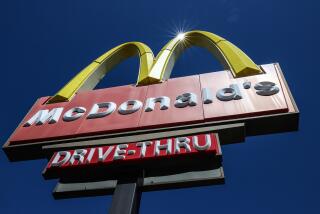Reaction mixed to Obama’s bid to hike minimum wage
President Obama’s new proposal to set a higher floor for wages faces an uphill battle in Congress — and the fight may well boil down to a matter of timing.
Obama, in his State of the Union address, called for increasing the minimum wage to $9 an hour from $7.25 in gradual stages by 2015. He said it was aimed at lifting families above the poverty line and putting more money in the pockets of consumers, which would end up helping companies.
While unions and labor advocates praised the proposal, Republican leaders and business groups immediately lined up against it, calling it an anti-jobs idea.
Most economists would hardly characterize it as anti-jobs, and they see benefits to lifting the fortunes of the working poor. The current minimum wage is just a little more than a third of the average hourly wage of $19.97 last month.
But economists did question whether it was the right time to bump up the minimum wage because the economy was still fragile and many employers remained reluctant to hire.
With unemployment at nearly 8%, and more than 12 million workers officially unemployed and millions more who have dropped out of the labor market, economists worry about what a bump in the minimum wage may do.
“I just see it as a nonstarter at this point,” said Sophia Koropeckyj, a labor economist at Moody’s Analytics. “I’m afraid it could have a bigger [negative] effect when there’s more slack in the economy.”
Employers in industries that typically pay minimum wage were also mixed in their views.
Selwyn Yosslowitz, co-founder of the California restaurant chain Marmalade Cafe, with 600 workers in 10 locations, said it was a bad time to raise the rate.
He already feels beleaguered by higher costs from Obama’s healthcare overhaul, he said. Should a new wage hike take effect, Yosslowitz said, he may have to repeat what he did in 2007 after California’s latest minimum wage law took effect. It gradually raised rates to $8 an hour a year later.
“You increase your menu prices and you reduce hours,” he said. “People who come in normally at 9 o’clock in the morning, you try to get them to clock in at 9:30 and save half an hour. We also stopped hiring people. You can’t stay in business if you don’t.”
Other small businesses, though, were quick to point out that their pay was already at or near $9 an hour, so it would not be a death knell by any means.
“I am sure it’s going to affect us a little bit. There would be cutbacks in certain things, less company dinners or whatever,” said Victor Nguyen, assistant manager at the long-standing men’s clothing shop Union in Los Angeles.
“But it’s expensive to live here, so if it did change, I’m sure the workers would be happy. [And] in the grand scheme of things, we’re not closing down next week if we give people another 75 cents or a dollar more,” he said.
Some agreed with Obama that in the long run, a raise for those at the bottom would be good not only for the working poor but for their own businesses.
“On balance it could be a positive thing because people will have more disposable income, like students and people working at fast-food or retail stores,” said Dov Charney, chief executive of American Apparel Inc. The Los Angeles manufacturer and retailer typically pays its garment makers more than the state minimum wage.
“If the wage is raised, we will be able to sell more because young people and people increasing in terms of their earning power will be able to buy more,” Charney said.
Obama’s proposal was part of an overall theme Tuesday night to bolster the middle class and narrow what has become an increasing wealth gap in the nation. He noted that 19 states already had set higher minimum wage requirements than the federal law. Washington state’s is the nation’s highest at $9.19.
Raising the federal rate to $9 an hour, the White House estimated, would lift the incomes of at least 15 million workers.
“Even with the tax relief we’ve put in place, a family with two kids that earns the minimum wage still lives below the poverty line,” Obama said. “That’s wrong.”
The federal minimum wage has gone up 14 times since 1970, the latest in August 2009, when it went up to $7.25 from $6.55 a year earlier and $5.85 in August 2007.
Obama supported a $9.50-an-hour minimum wage when he was campaigning for president in 2008 but has been largely silent on the issue since.
The renewed push reflects an effort to do something about the nation’s problem of stagnant incomes and a poverty rate that has risen during the Great Recession to 15% of the country’s population.
Obama probably received solid backing on the idea from the chief of his Council of Economic Advisers, Alan Krueger. As a Princeton professor with economist David Card of Berkeley, Krueger did case studies that found that raising the minimum wage did not lead to increased unemployment.
But a larger and longer-running body of academic work, notably by David Neumark of UC Irvine, found that increasing minimum wages led to a moderate decline in employment for low-skilled workers.
What’s more, his research suggests that a chunk of the gains in higher wages may go to middle-class teenagers, with some adults getting squeezed by a reduction in jobs or hours.
Harry Holzer, a Georgetown University labor economist, also was concerned about the timing.
He noted that only 31/2 years have passed since the government last raised the minimum wage, too soon given the current economic conditions. Small employers have lagged in job creation, largely because of weak sales but also because of uncertainties in the economic and political climate.
“I personally wouldn’t want to give them one more reason to sit on the sidelines,” he said, “even if the effect is modest.”








